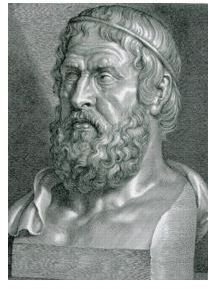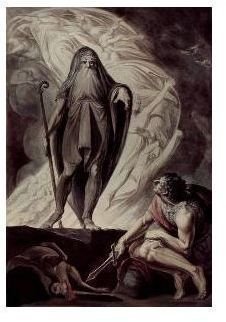Antigone Character Analysis: Learn Elements of the Characters Creon, Antigone, the Chorus & Others
Creon from Antigone
We’re going to switch things up a bit and begin the character analysis with Creon instead of the heroine Antigone. He is, after all, the tragic figure of the play.
Creon declares himself King of Thebes after the death of the two rightful heirs, the brothers Eteocles and Polyneices. It is unclear exactly what role Creon has in their death, but it’s notable that Creon persuades Eteocles to not give up his rule after his first year is up (the two brothers were to alternate being king).
As the play opens, Creon (the uncle of the dead brothers and their sisters Antigone and Ismene) has made himself king and attempts to establish legitimate rule with a speech and decree. He states that Eteocles will receive a proper burial with all the rights and ceremonies accorded a hero; Polyneices, on the other hand, is forbidden a proper burial and anyone trying to give him a burial will be executed. For those unaware of Ancient Greek religion, a proper burial is necessary to ensure acceptance into the afterlife. Failure to receive a proper burial results in pointlessly roaming the Earth for eternity.
Despite well reasoned arguments from Antigone, Haemon, the Chorus, and Teiresias, Creon relents only after disaster strikes. Creon fits the description of the play’s tragic character for the following reasons: (1) He is a noble figure; (2) He possesses a tragic flaw, hubris or extreme pride; (3) His tragic flaw causes him to do something really stupid; (4) Fate conspires against him; (5) He realizes his mistake too late; (6) He is punished severely by the gods.
Main Characters

- Antigone is the play’s hero (whether she is the tragic hero is a matter of debate). She recognizes an unjust law and sacrifices her life to correct it. She is abandoned by her sister Ismene, who does not feel it is a woman’s place to go against the king. In the true order of sacrifice she makes her act known publicly. Antigone is convinced that fate has decreed her destruction. She goes to her grave defiant, hanging herself minutes before she is to be set free by the penitent king.
- Ismene, Antigone’s sister, knows Antigone’s plan but refuses to take part in it. After the act is accomplished and Antigone discovered, Ismene tries to accept responsibility. Antigone refuses to allow it.
- Haemon, Antigone’s fianceé and cousin (considering Antigone’s father is also her brother, this is an improvement) pleads with his father to listen to reason. An argument ensues. Haemon tries to kill his father then kills himself. Inasmuch as Antigone uses emotion to persuade the king, Haemon uses logic and reason.
Other Characters
-
Eurydice, Creon’s wife, appears in the last scene. She hangs herself after hearing of Haemon’s death and blames her husband (she actually blames her husband before she dies, being unable to speak after she dies).**

**
-
Teiresias reports unusual goings-on in the room of augury. He reports his findings to Creon and interprets them as a punishment to Thebes if Creon does not pardon Antigone and revoke the law. The two argue. Teiresias wins.
-
The sentry makes two appearances in the play. He reports the burial of Polyneices in scene 1 and returns with the prisoner Antigone in scene 2. Despite the dangerous situation in which he finds himself, the sentry suggests that Creon’s law is unjust.
-
The messenger informs Choragos in scene 5 how Antigone and Haemon die.
-
Choragos is the leader of the chorus and its spokesperson.
-
The chorus has the following roles in Antigone:
- It explains the action.
- It interprets the action in relation to societal customs and the laws of the gods.
- It foreshadows.
- It plays a part in the drama.
- It presents the author’s views.
This post is part of the series: Antigone Study Guide
Rebel against an unjust test by using this Antigone Study Guide.